It's hard to study on an empty stomach
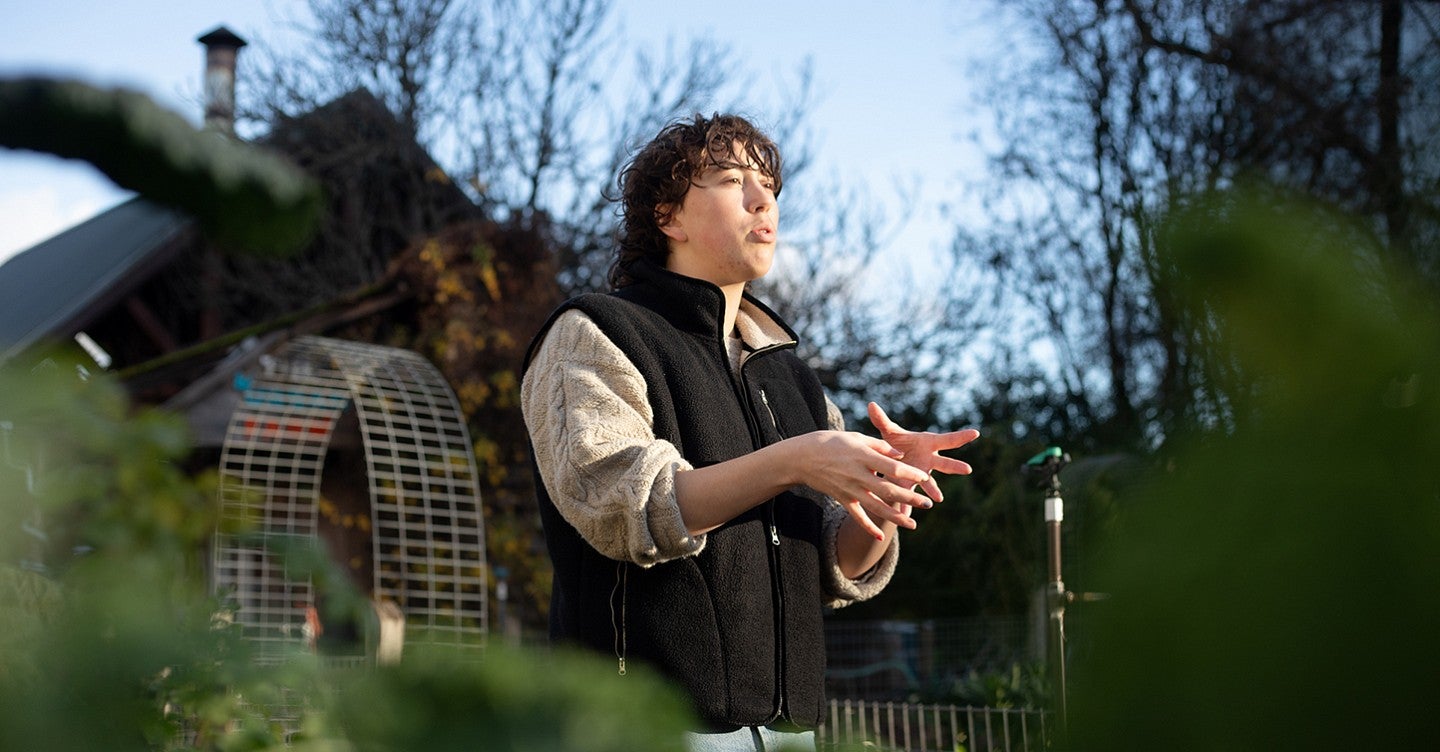
Students can find information about UO's Basic Needs program on its website:
UO Basic Needs
Clark Honors College senior Teddy Clayton remembers the first time he walked into WinCo Foods with an EBT card for the Supplemental Nutrition Assistance Program. “EBT gave me the freedom to breathe,” he recalls.
The bright lights and plastic bulk bins of the bargain grocery store remained the same, but Clayton felt completely different. “I could feel the physical weight off my chest and out of my lungs,” he says.
To Clayton, food insecurity has always been a physical feeling: a grumbling stomach, the inflexibility of grocery budgeting, and tenseness around the subject of food. It was unfathomable to Clayton that he would be able to fully fill his stomach by using EBT.
“When I found out I could have 200-something dollars for food a month, I was so surprised,” he says. “I had never spent that much on groceries in my life.” He navigated WinCo Foods, indulging in collard greens and breakfast foods that usually didn’t fit in his budget.
Clayton is not alone in his invisible struggle for food security as a college undergraduate. A report from the UO Student Wellbeing and Success Initiative found that 22.1% of students at UO were food insecure in the 2020-21 academic year, which was double the national rate. In the last four years, the national rate of food-insecure students has multiplied from 10.5% to 23%. As the cost of college tuition continues to rise - an estimated 9.24% increase from 2010 to 2022 - more and more students struggle to afford groceries. Across the United States, one in five college students aren’t having their nutritional needs met.
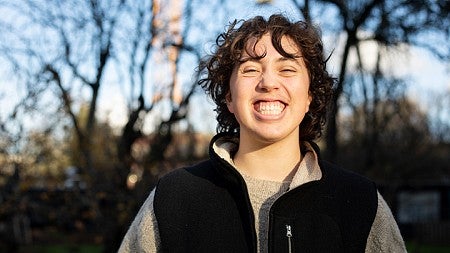
Clayton’s family moved to McMinnville from Texas when he was four, and their heritage always came through in his family’s cooking. Clayton cites his Southern roots as the origin of his resourcefulness, which came in handy when his household was making food stretch.
“Spaghetti leftovers would become a Manwich, and then we would get some turkey so it would turn into stew,” he recalls. “My family has always been very good at repurposing food.”
Although they didn’t discuss it while he was growing up, Clayton realized that the family’s resourcefulness meant his family wasn’t always food secure. They would sometimes visit the church food bank or lean on other community members for meals during hard times. Clayton’s family would always return the favor, cooking for neighbors when they were sick or during the holidays.
Running on Empty
Clayton keeps the community spirit around food alive in college. He leans on his friends just as they lean on him, and during the harder moments, they’ve had his back.
He remembers March of his first year when he couldn’t go home for spring break because of the pandemic. He didn’t have access to his meal plan for a week, so while he stayed in the dorms, he only had 50 Duck Bucks. “My COVID bubble and I, thank God for them, pooled together our grocery money and all cooked together that week,” he says.
They made stir fry and oatmeal and rice dishes, repurposing their leftovers again and again in the dorm kitchens. “(The University) leaves you high and dry for that week, with the assumption that you have a security net to fall back on, but a lot of students don’t,” he says.
Moving out of the dorms was a relief. Clayton was glad to be cooking for himself because he was dealing with myriad new allergies that severely limited what he could eat on his meal plan. However, his sophomore year at the university was one of his most food-insecure periods. He hadn’t pushed himself to sign up for an EBT card yet and was running out of savings from high school. Luckily, the Urban Farm, an agricultural course taught through the University, subsidized a lot of his meals that year.

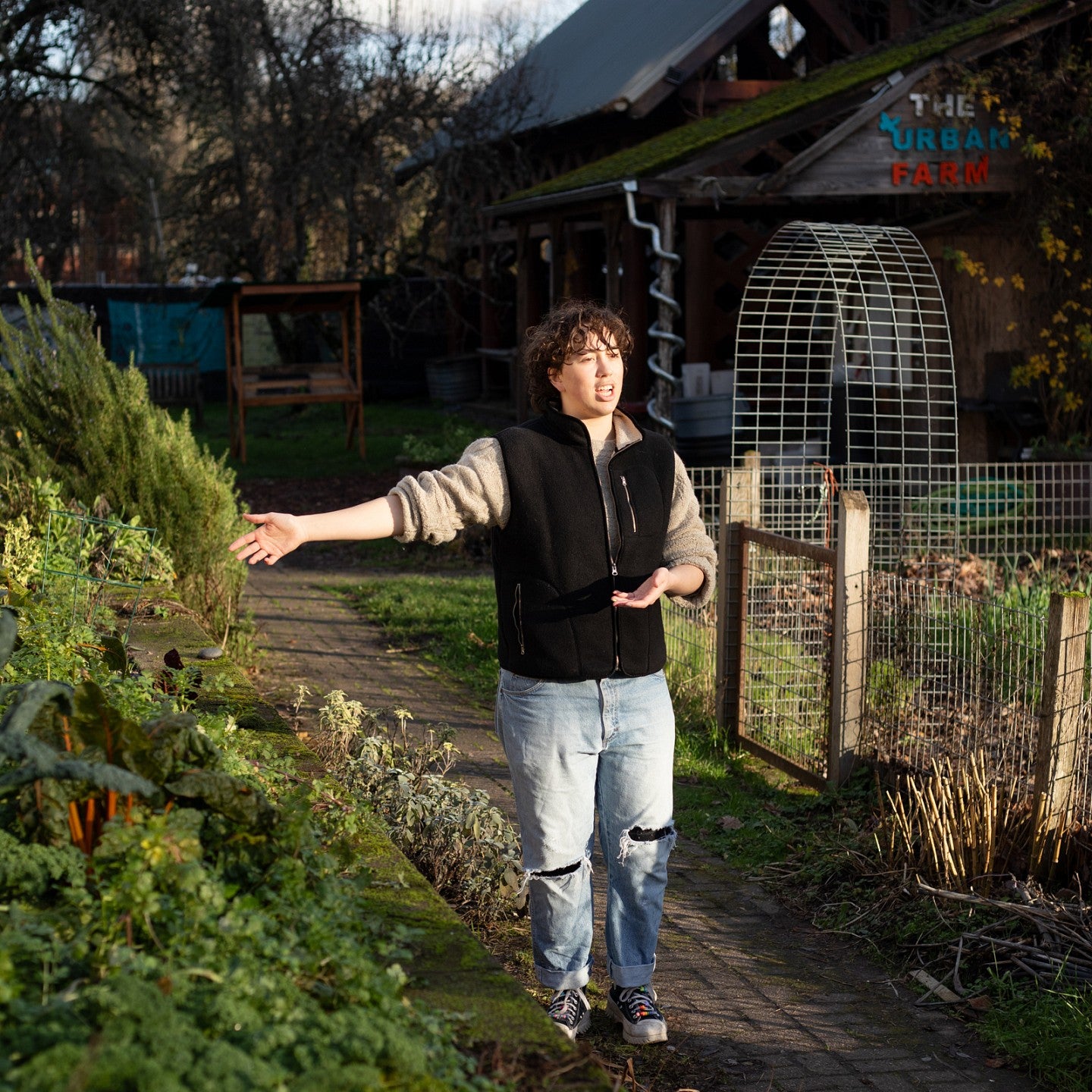
Clayton remembers working in the Urban Farm plot on the purple broccoli plants. Large, leafy roughage from the plant hid the gems of purple broccoli. He and his small group would cut off just enough produce for everyone to have some and put it in the farm’s communal produce area.
“People never wanted to take the roughage, so I would just take home bushels of it and steam it,” he says. He would eat it with salt, going back to his family’s Southern tradition. At a time when Clayton didn’t have enough money to afford fresh fruits and vegetables, the produce from the Urban Farm meant everything to his diet.
“I spent a lot of time as a young adult at the end of my rope,” Clayton says about his time as a college student. “I was so strict on food budgeting and figuring out what I could do to make food stretch for me.”
He could feel it taking a physical toll on him. Becoming more involved in the food studies program at UO helped open his eyes to the options that food-insecure students have. He knew he was running on empty but says that without the push that he ended up getting, he might have been under duress for longer.
Clayton was at a mutual aid fair in the spring of his sophomore year when an older friend approached him about how he was doing with food access and money. “They used our relationship as peers and friends to help me feel safe and comfortable in the process of getting government assistance,” he says.
After having his food insecurity validated, he signed up for an EBT card. He had put it off as long as he could because of the social stigma. “We make being poor and being resource insecure very embarrassing and miserable socially,” he says. “Signing up for EBT is far from glamorous.”
“We make being poor and being resource insecure very embarrassing and miserable socially. Signing up for EBT is far from glamorous.” ”
But something his friend said stuck with him during the process of signing up. “They said, ‘If you believe in the things you're studying, like receiving mutual aid and government assistance, then you have to believe in receiving them for yourself,’” he recalls.
Now in his fourth year at UO, Clayton is working on a thesis about food insecurity and ending “food apartheid,” which he defines as “the intentional construction of systems that cause food insecurity along existing lines of marginalization, especially race.” He has focused his Planning, Public Policy and Management major on his interest in food studies and food insecurity. His thesis will focus on ending food apartheid by showing how small communities can gain access to localized grocery stores that fit their needs.
It will be “something usable that feels like it had an impact on my field,” he says. “As someone who has experienced food insecurity at many different stages of my life, I want to feel like I am supported by whatever work I’m doing with this.”
There’s More We Can Do
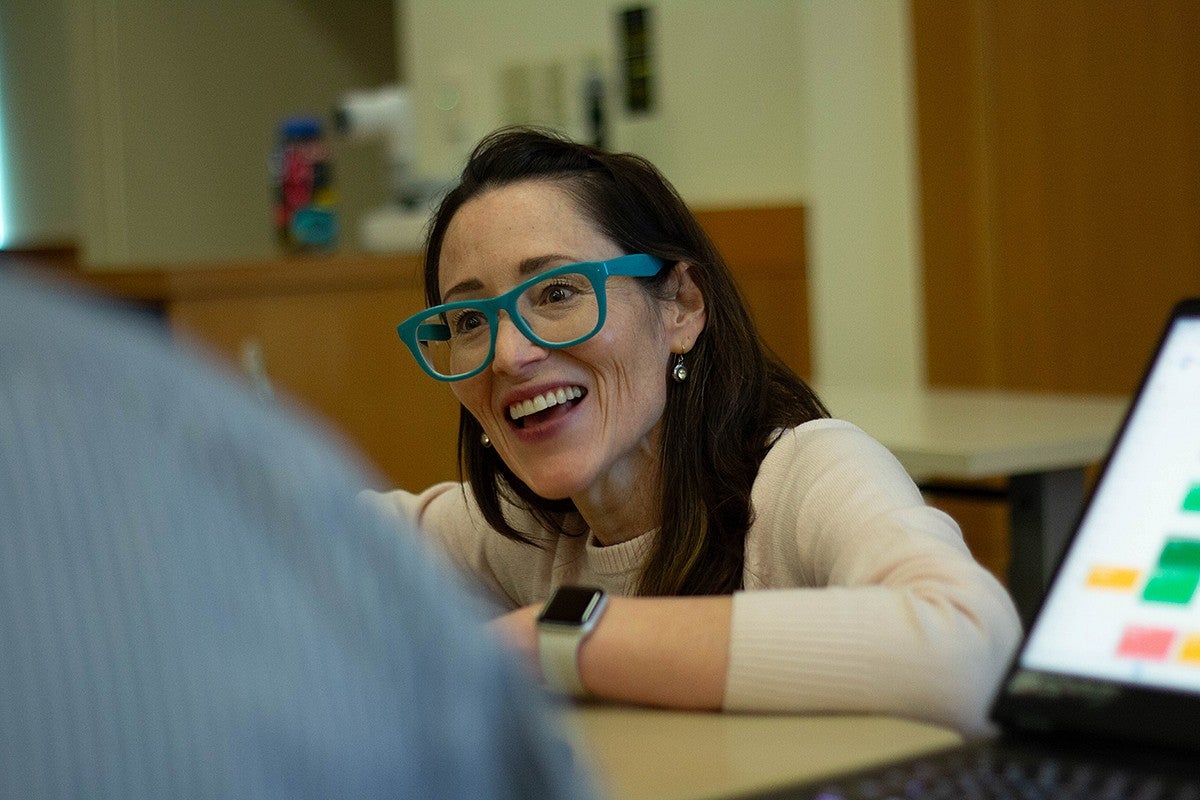
Honors College and history instructor Hannah Cutting-Jones walks by barrels of $1 apples in the Erb Memorial Union and frowns to herself, remembering a statistic citing that more than one third of University of Oregon students experience food insecurity at some point during their college career. “It is a shameful statistic to me,” she says. “Could we find a way to make these apples free for students?”
As someone who cares deeply about student access to nutritious and culturally appropriate food options, Cutting-Jones also serves as the director of UO’s Food Studies program and is passionate about studying food because of its “democratic” nature. She says food is a topic all individuals can understand and relate to in some way. Food, she says, is “an incredible way to get at many other issues.”
As a CHC instructor, Cutting-Jones makes space for students to learn more about food-related issues through courses like “The Protein Wars” and “Philosophy of Food.” After being selected as the Food Studies director in September 2022, Cutting-Jones focused on brainstorming ways to support students facing food challenges and mitigate food insecurity on campus.
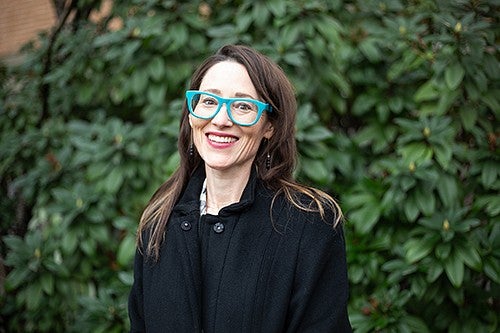
“You cannot have a successful experience here if you are hungry,” she says. She believes that communication around food insecurity is essential and that there should not be shame or stigma around the subject.
“This is a huge university. It has a lot of clout in terms of its environmentally friendly focus,” she says. “So let’s be a leader in sustainability and food security issues. Let’s be a program that provides healthy, nutritious food for students.”
Taking Food Security Seriously
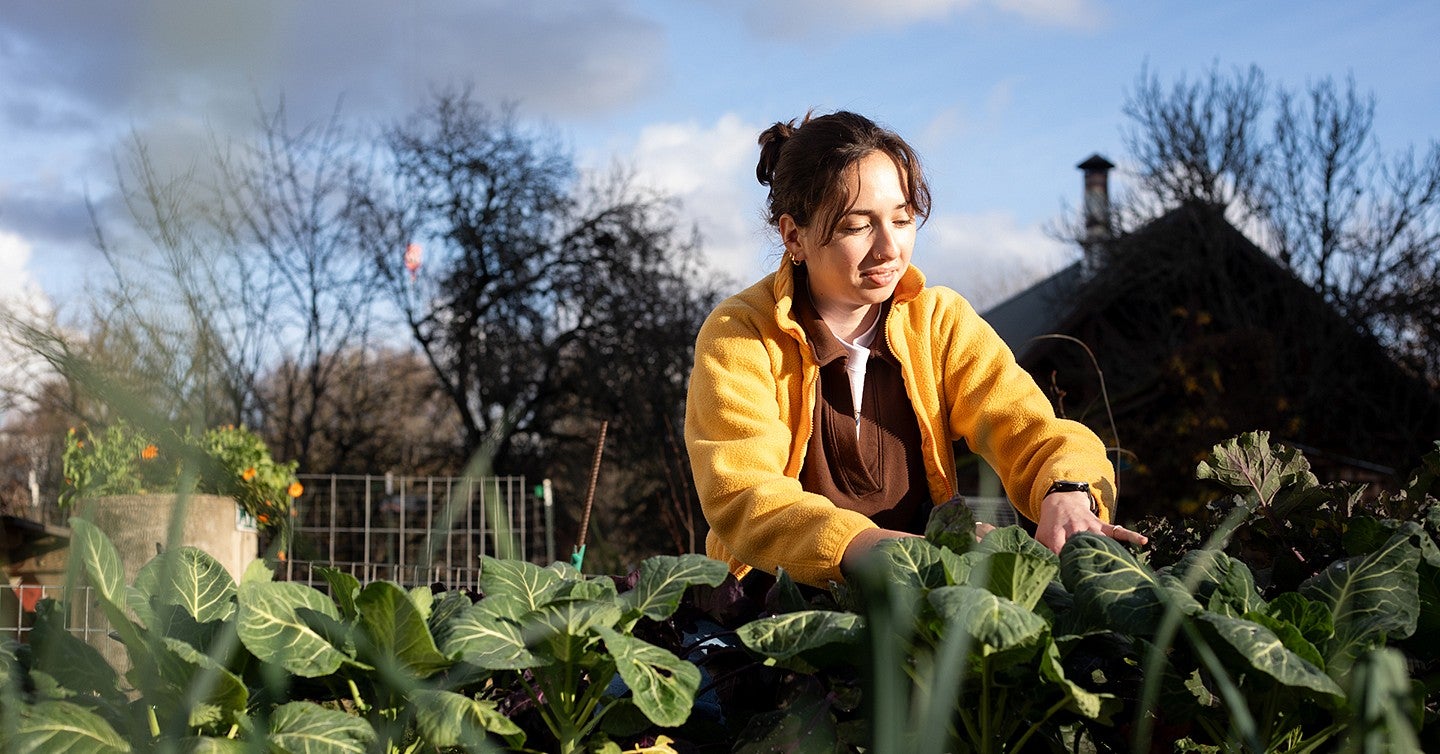
CHC senior Keaton Ibendahl first noticed a difference in the way other students were cooking when she moved out of the dorms. She remembers being at her boyfriend’s household on a school night and watching him and his roommates prepare dinner. Their meals consisted of microwavable Trader Joe's dinners, while she and her roommates tried to prioritize cooking with fresh ingredients. This difference troubled Ibendahl, who thinks some college students are suffering from a lack of knowledge in terms of grocery budgeting and nutrition.

“The difference is a lack of food management knowledge and skills, and I think a lot of other students experience that gap with the off-campus transition,” Ibendahl says. “Not having any guidance in terms of how to meal-plan, how to make a budget and basic food-preparation skills makes that transition difficult.”
Ibendahl hopes to focus her thesis on the stereotype of the starving college student and how it trivializes the struggles of students battling food insecurity. “My idea with this project is to find out if the stereotype of the starving college student is more than a funny little joke,” Ibendahl says. “And yes, of course, I’ve found that it is real.”
She’s been surprised and disappointed by the statistics from her research, saying that “food security programs are so effective and could work so quickly, but for some reason, they’re just not clicking on college campuses.” Ibendahl hopes to make a resource handbook on food management and campus resources for food-insecure students to go along with her written thesis. She hopes it will help combat students’ lack of knowledge and resources, one of the many effects of food insecurity on college campuses.
Data shows that Clayton’s story is more prevalent than some might think. He encourages other students in similar situations to ask for help, even though it can be uncomfortable. “If you’re not eating because you are afraid of decreasing your food supply,” he says, “afraid of not having enough; if you’re out of food; if you feel anxiety around food, you deserve to feel comfortable and safe and secure that you can eat as much as you need and want.”
